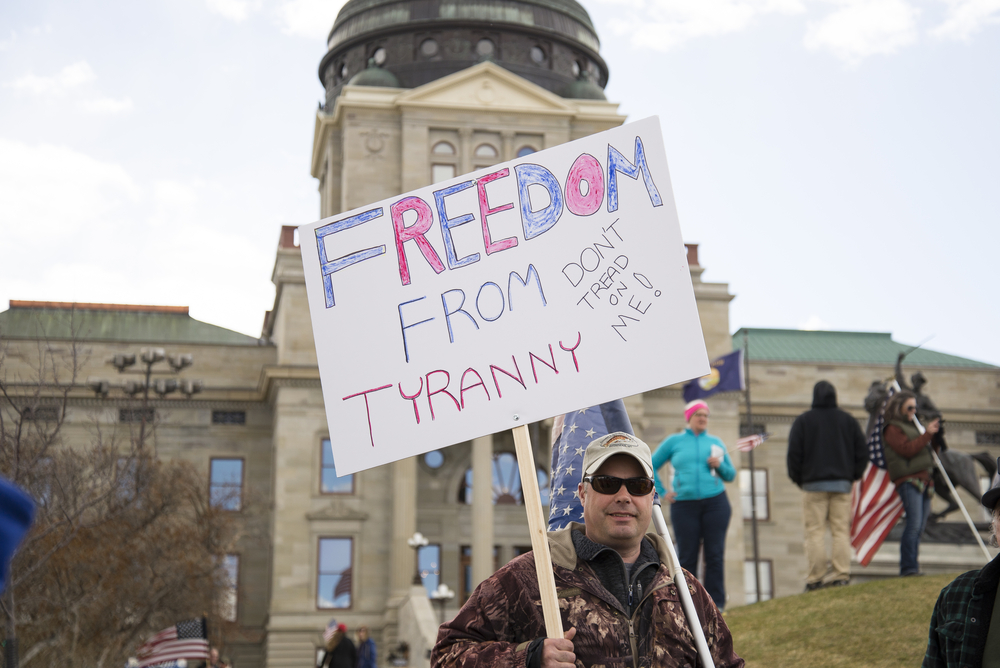The COVID-19 pandemic has created several problems that pit sacrifices for the collective good against individual resistance on the basis of upholding some perceived “right.” For example, should people be expected to wear masks? Are people obligated to follow social distancing guidelines? Is a lockdown justified? Are we obligated to get vaccinated once it is possible? But, what do we mean by “rights” in these cases? And, how has an understanding of political philosophy (or lack thereof) helped or harmed social attempts to manage these problems?
Resistance to social-distancing and mask-wearing is controversial. Those who have been most vocal in their resistance have acknowledged the pushback they get. It is no surprise why either: failure to wear masks, failure to socially distance, failure to isolate, and failure to eventually get vaccinated make the problem of the pandemic worse for everyone else and will likely prolong its effects. Consider the issue of following social-distancing guidelines. A party of about 25 people this month led to over 350 people having to quarantine after the party became a super-spreader event. The less effort that people put into following public health recommendations, the easier it becomes for the virus to spread and the worse the rest of us are for it. Now polling suggests that only 58% of Americans plan to get vaccinated, and if there is great resistance to vaccination then the problem will only be prolonged further.
There are a myriad of possible reasons for not following these guidelines (and in some cases laws), but one that is often cited is that the guidelines are a violation of individual freedoms or rights. Several of the protests, rallies, and calls for “liberation” from lockdowns and mask mandates have justified their actions on the basis that such measures violate fundamental freedoms and rights. For example, MLB player Aubrey Huff declared in June that requiring people to wear a mask is “unconstitutional to enforce,” and as The Washington Post reports, “many say that they have a ‘constitutional right’ not to wear masks and mask mandates are forms of totalitarian rule.” In Brazil, President Jair Bolsonaro declared that he would refuse to get vaccinated, citing his rights. Even in Canada the provincial government of Alberta, currently one of the worst hotspots in the country, has resisted mandates on the basis that it could infringe on constitutional rights. Premier Kenny recently pointed to Canada’s Charter of Rights and Freedoms as a reason they are avoiding greater restrictions.
Of course, the question really is whether people do have a right to not wear a mask or do have a right to violate public health regulations. As many Canadian legal experts have pointed out, Kenny’s reasoning is faulty. Canadian rights and freedoms are inherently subject to “reasonable limits” by the constitution as can be justified in a “free and democratic society,” but American constitutional rights are slightly more absolute in character. Still, where is the protected right to not wear a mask or to violate public health standards? Many would argue that they are covered by the first amendment, but short of a court ruling on this matter, it is hard to argue that one has that right at all. If I were a legal positivist, for example, I might suggest that the only “rights” that one has are ones that are determined by court rulings. Therefore, in keeping with the positivist slogan that ‘law is law,’ until courts rule on the constitutionality of something like a mask mandate, one cannot claim they have a right to not wear one. On the other hand, one may take a more natural law view and proclaim that such rights are not for courts to say we have them, they are inherent and inalienable.
Regardless of whatever right is actually protected by whatever court, people will continue to resist if they ‘feel’ it within whatever perceived ‘folk’ conception of rights they have. Thus, this is not merely a public health issue or a legal issue, but a philosophical issue in the truest sense. What justification do people have for proclaiming that they have a certain right? For example, if someone who rejects the mandated wearing of masks because it violates their rights, do they perceive these rights as inherent or conventional? Also, how are generally understood constitutional rights translated into perceived rights to take certain actions in specific situations like not wearing a mask? A common aphorism about rights holds that one’s right to wave one’s fist ends at the tip of another person’s nose may be used to justify resistance to health measures. But, what about when the concern isn’t a fist touching your nose, but the particles you expel into the air? Whose nose takes priority, everyone else in public or the people who refuse to wear a mask?
Through all of the problems of masks and public health mandates, the central question is what should be the relationship between society and the individual and to what extent does the individual have to make a sacrifice? These kinds of questions will only become more significant over time. Many governments may need to raise taxes to pay for pandemic-related spending. The public may be expected to practice further sacrifice and restraint in the future in the face of climate change. If so, then for the sake of the public democratic conversation alone, it would not hurt if people were more familiar with the philosophical justifications they think they have for resisting efforts to effect the common good. Perhaps civics education and the practice of being a good citizen should include a background in political philosophy?
One really good reason to consider this is that traditional ‘folk’ understandings of rights are often based on historical notions that do not fit the modern highly-connected world. Despite what many may think, even philosophers like Locke, who was influential in formulating such rights, believed that rights do not eliminate obligations to others. The action of one individual can have such far reaching consequences (such as one house party leading to hundreds of infections and possible deaths) in a way that was not possible when the concept of rights in a liberal democracy were formulated. A more public conversation about how we collectively ought to understand our rights and obligations in the 21st century could alleviate political confusion and delayed action. Another good reason is it would make it more obvious when people assert some right arbitrarily. One does not get to claim a right merely because they feel they have one, nor can they legitimately claim “I exempt myself” without reason.
On the other hand, traditional political philosophy can also confuse and obstruct the kinds of interactions that take place between an individual and society. Perhaps the problem is retreating behind political philosophies which have become political dogmas. Instead of thinking about the individual and the state as ontologically separate things which are opposed, we may instead consider the scientific reasons why the public is so skeptical and so unwilling to work for the common good. If we treat society and individuality as a process of securing capability and responsibility, then the moral lesson might be to not make this a rights issue at all. Perhaps the problem we face is how to secure public cohesion so that more people are willing to do their part even if they have a right not to.


